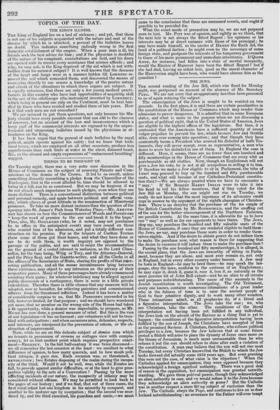THINGS TO BE THOUGHT OF.
ON Tuesday night, there was a very sotto voce discussion in the House of Commons on the subject of renewing Patents and Com- missions on the demise of the Crown. It led to no result, unless something distantly resembling a pledge from the Chancellor of the Exchequer, that in the event alluded to, time should be allowed to bring in a bill, can be so construed. But we may be forgiven if we do not attach much importance to such pledges, even when they are more distinct. There is a conventional distinction between political and personal veracity, and again between political and official vera- city, which allows of great latitude in the construction of Ministerial promises. To take no more distant instance than the question of the opening into St. James's Park from Waterloo Place,—Mr. ARBUTH- NOT has shown us how the Commissioners of Woods and Forests can "keep the word of promise to the ear and break it to the hope." Thus, also, Mr. GouLnuarr (who, be it noted, may not perchance be in office in the anticipated event) may turn round on those who remind him of his admission, and put a totally different con- struction on his promise. For as the tenants of Carlton Terrace (how some of them got their leases, and what they have done or are to do with them, is worth inquiry) are opposed to the passim of the public, and are said to resist the accommodation on the ground of a vested interest in seclusion, so the Lord Chan- cellor, for the time being, Whig or Tory., and the Attorney-General, and the Privy Seal, and the Gazette-writer, and all the Clerks in all the offices of the Secretaries of State, sharingthe profits of that inter- esting publication, and all the mesne incumbrances lying between these extremes, may object to any intrusion on the privacy of their respective purses. Many of these personages have already commenced counting their gains ; for whatever indelicacy may be alleged against public discussion of a contingency, there is none in a little private calculation. Therefore there is little chance that any measure will be adopted, now or hereafter, for relieving patentees and commissioned officers from the threatened infliction. Indeed it has been a matter of considerable surprise to us, that Mr. PONSONBY succeeded in his bill, however limited, for that purpose; and we should have wondered yet more, that no member on the wrong side of the House had taken a fit opportunity, while a demise was improbable, to propose, as Mr. HUME has now done, a general measure of relief. But this is the vice of our legislation—it has no forecast; our volunteers will not be trou- bled with anticipations ; and when occasions arise, delicacies, respects, and interests, are interposed for the prevention of reform, or the ob- struction of improvement. Now, while we are on this delicate subject of demise (one which no tenants in possession of crowns or cottages view with compla- cency), let us hint another point which requires prospective enact- ment—REGENcY. In the last half-century it was twice discussed— we all remember the last occasion at the least : we recollect to what difference of opinion, to how many quarrels, and to how much poli- tical intrigue, it gave rise. Each occasion was, or threatened, a REVOLUTION; two Estates disposing of the realm during the incapa- city of the third. Would it not be well, now, while the Estates are full, to provide against similar difficulties, or at the least to give pros- pective validity, to the acts of a Convention ? Passing by the more afflicting incidents of our nature, the incapacity of infancy may be considered without offence. We may be permitted to look back to the pages of our history; and if we find, that out of three cases, the first royal infant lost one kingdom in his minority by conquest, and another in his maturer age by usurpation ; that the second was mur- dered by, and the third executed, his guardiatiand uncle,—we must come to the conclusion that these are untoward events, and ought if possible to be provided for. What the exact mode of precaution may be, we are not prepared even to hint. Mr. PITT was of opinion, and rightly as we think, that the next heir is not always the fittest Regent : his opinions or his interests may be at direct variance with those of his principal ; he may have made himself, as the uncles of HENRY the Sixth did, the head of a political faction ; he might even be the sovereign of some foreign state, and postpone the interests of his temporary government to those of his more permanent and immediate inheritance. If Queen ANNE, for instance, had fallen into a state of mental incapacity, would the Elector of Hanover have been the fittest Regent ? but if she had died, leaving an infant heir, good as the moral character of the Hanoverian might have been, who would have chosen him as the guardian ?


















 Previous page
Previous page